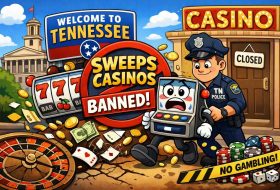
The debate over skill game machines in Virginia has taken another turn after a county judge ruled that the Queen of Virginia (QVS2) games are legal. Judge Hugh Campbell of the Hanover County General District Court dismissed a case against David Bogese, owner of the Breez-In Mart. Bogese was charged with a misdemeanor for possessing illegal gambling devices under Virginia law.
The judge determined that the Pace-O-Matic (POM) games do not meet the legal definition of an illegal gambling device. That’s because they do not require players to insert coins, bills, or tokens to play. Judge Campbell also found that the gambling statute’s definition is too vague, making it difficult for business owners to follow the law.
New hope for VA skill game proponents
The judge’s decision could bring hope to skill game proponents in Virginia. In 2020, the state voted to ban the games, but due to COVID-19, the ban didn’t go into effect until the following year. However, that ban was legally challenged, allowing skill game machines to remain operational. That changed in October 2023, when the Virginia Supreme Court intervened and deemed skill games illegal, confirming the ban.
POM argues that it has designed the QVS2 machines, a redeveloped version of the Queen of Virginia games popular in small businesses before the ban, to comply with current laws. The machines are cashless, and players must check in with a store attendant before starting a game. In anticipation of legislative challenges, POM raised the minimum age to 21.
Virginia was close to regulating skill games in 2024
While the Virginia Supreme Court deemed skill games illegal, manufacturers like POM continue redeveloping new versions, leaving the machines in a gray legal area. In 2024, Virginia lawmakers made a serious attempt to regulate them. The state’s General Assembly passed a bill that legalizes and regulates skill game machines.
However, Gov. Glenn Youngkin vetoed the bill and returned it with amended recommendations. The Virginia Senate rejected his amendments and sent back the original proposal. In response, the governor vetoed it a second time. The House needed a two-thirds majority to override the second veto, but supporters fell short, effectively killing the effort to legalize skill games.
During the 2025 legislative session, lawmakers introduced a few proposals on skill game regulation. However, they all failed to gain traction.
POM has been involved in several legal battles
POM, one of the largest manufacturers of skill games, has consistently challenged legal actions against its machines. The company scored a significant victory in 2023 when a Pennsylvania county court judge deemed its games legal. Pennsylvania currently does not regulate skill games, and there’s an ongoing debate on whether to regulate or ban them. Last year, the state’s Supreme Court agreed to hear arguments from state authorities, with the ruling potentially helping resolve the status of skill games.
POM has also suffered legal setbacks elsewhere. Last year, a Kentucky county judge upheld the state’s ban on the games, rejecting POM and small business owners’ challenges. Additionally, POM is a defendant in a lawsuit by the nonprofit Empathy in Action. The plaintiff seeks to use a 1798 law to recover losses that Kentuckians allegedly suffered from skill games.
Meanwhile, at the beginning of the year, the Kansas Supreme Court dismissed a lawsuit by POM’s subsidiary seeking to confirm the legality of its Dragon’s Ascent game. However, the ruling did not decide the legal status of skill games. Instead, it allowed them to continue operating in a gray area in Kansas.





